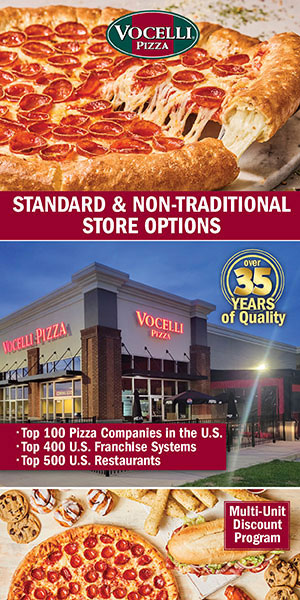Collaborating on Local Marketing at Quaker Steak & Lube
Guerilla marketing, grassroots marketing, local store marketing... Whatever you call it, all sales are local, to paraphrase former U.S. Speaker of the House Tip O'Neill. Increasingly, franchisors are taking the local marketing bull by the horns and establishing collaborative programs with franchisees to increase sales. This case study looks at how a franchisor and its franchisees are working together in an innovative local store marketing program.
When the weather in Pennsylvania turned unexpectedly warm this past March, the local Quaker Steak & Lube held an "emergency" bike night in their parking lot--much earlier in the year than usually possible.
"Quaker Steak & Lube uses our parking lots as a revenue generator, with lots of outdoor events," says Russell Berner, vice president of restaurant operations for JDK Management Company in Bloomsburg, Pa. "It's a marketing tool for people to have fun and come back other times."
JDK also operates other restaurants (Perkins), hotels (Holiday Inn Express, Microtel Inn, Econo Lodge, and Hampton Inn), and nursing facilities across six states in the eastern U.S. And at their Florida Quaker Steak & Lube location, the parking lot events for bikers and car enthusiasts are year-round (barring hurricanes).
"We operate from some of the largest brands to new, up-and-coming brands like Quaker Steak & Lube," says Berner. Local store marketing at the grassroots level is part of the brand's roots, he says. "We follow that model as we develop in small and medium markets."
About three years ago, Quaker Steak & Lube embraced a local store marketing program at its corporate restaurants and created marketing activities coordinator (MAC) positions. The MACs focus on driving traffic to restaurants through activities such as daily events, community participation, and doing anything and everything to promote the restaurants. The MAC positions, which steadily expanded from part-time, resulted in increased sales at the corporate stores. When franchisees got wind of that, they wanted in.
"The franchise community was asking, 'What are the company restaurants doing that's working so well?' The managers at the company restaurants attributed it to great operations and the matured MAC program," says Megan Duniec, director of field marketing for the Quaker Steak & Lube Support Center in Sharon, Pa.
Although some franchisees embraced the MAC program around this time, it soon became clear to them that the MACs at their franchise units needed additional training and guidance. So in July 2011, The Lube restructured its field marketing support to help franchisees attain similar results, hiring three field marketing strategists, which they call MACROs (marketing area catalyst of revenue optimization).
With the introduction of the MACRO team, each franchise location was asked to employ a local MAC. The MACRO team would then help support the local MACs, with the ultimate goal of increasing same-store sales through local store marketing. MACROs devote their time to training and developing restaurant-level MACs, implementing restaurant visits, helping to create marketing and PR plans, and delivering additional support tailored to the local market.
"In 2011, The Lubes that embraced the MAC program saw same-store sales rise 2 percent," says Duniec. "A strong local store marketing program can keep you on the minds of your guests far beyond their time spent within your four walls," she says.
"It's probably the most progressive thing I've ever seen in local store marketing support," says Berner. "They've put their money where their mouth is."
The addition of the MACRO positions changed what was seen as an additional burden--despite the positive results--into a program offering additional support to attain those results.
The MACs work out of the local restaurant and are paid by the franchisee or company restaurant, while the MACROs are supported by the system's advertising fund. "That's the direction the franchisees wanted," says Duniec. "This allows the general manager to entrust someone else to handle those things, and to focus on operations."
Berner agrees. "It was a mutual approach. We wanted more support in marketing and getting the word out. Since we can't afford television-type penetration and corporate was doing a very nice job with it, we asked for more," he says. "They stepped up and hired additional personnel for more local support."
Initial results from the collaborative program include more Facebook fans, email club members, and text message recipients. Growing these databases is a key focus of the program.
"Once the infrastructure and personnel are in place, it's all about what tactics and programs are developed at all levels to be used in local store marketing," says Berner. "They always had a strong marketing department with creative, entrepreneurial thinking. It's the core and essence of the brand, and they found a way to build on and improve that for the franchisees."
Franchisee buy-in, often a problem when spending is involved, was not a problem here--in fact, it was the opposite. "They're the ones that drove that structure," says Duniec. "Without that support from operators it's hard to keep something like this going."
Share this Feature
Recommended Reading:
| ADVERTISE | SPONSORED CONTENT |
FRANCHISE TOPICS
- Multi-Unit Franchising
- Get Started in Franchising
- Franchise Growth
- Franchise Operations
- Open New Units
- Franchise Leadership
- Franchise Marketing
- Technology
- Franchise Law
- Franchise Awards
- Franchise Rankings
- Franchise Trends
- Franchise Development
- Featured Franchise Stories
| ADVERTISE | SPONSORED CONTENT |








 The franchise listed above are not related to or endorsed by Franchise Update or Franchise Update Media Group. We are not engaged in, supporting, or endorsing any specific franchise, business opportunity, company or individual. No statement in this site is to be construed as a recommendation. We encourage prospective franchise buyers to perform extensive due diligence when considering a franchise opportunity.
The franchise listed above are not related to or endorsed by Franchise Update or Franchise Update Media Group. We are not engaged in, supporting, or endorsing any specific franchise, business opportunity, company or individual. No statement in this site is to be construed as a recommendation. We encourage prospective franchise buyers to perform extensive due diligence when considering a franchise opportunity.